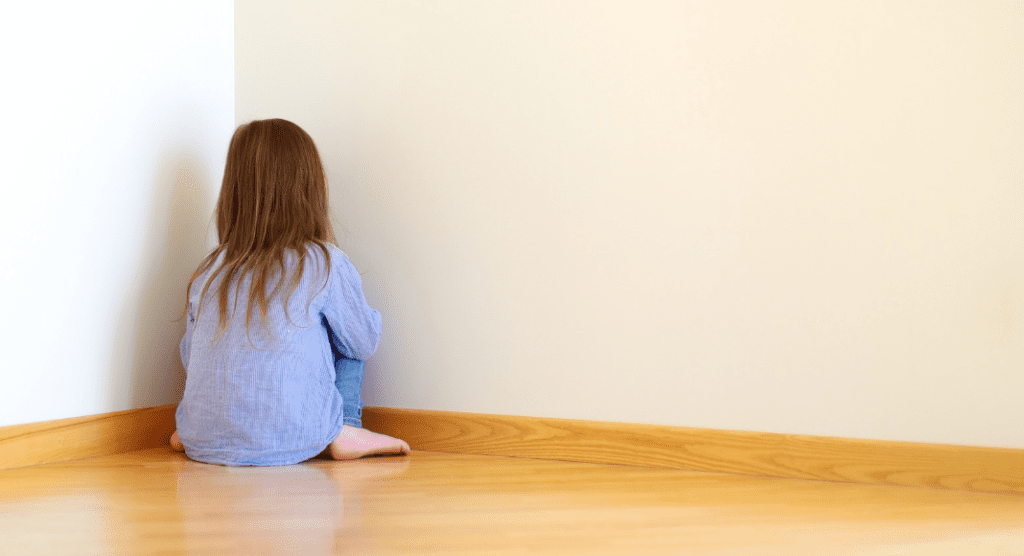Disclaimer: This post is the perspective of one local parent, however, the American Academy of Pediatrics does not endorse spanking as a form of punishment. You can read their position statement HERE.
Spanking is one of the topics that has recently become taboo in the parenting world. Many people have very strong emotions and beliefs about it and quickly place it into the “abuse” category. Spanking has also gotten relabeled in many circles as “hitting;” and since we teach our children hitting is not okay then we must equally put spanking in that same class. I do not subscribe to this line of reasoning. In fact, I believe that there is and should be a distinction between what we call spanking and what we call hitting. I say this because there are too many children that are hit, I have seen this in my line of work, children who are abused and have been taken advantage of by the adult caretakers in their lives. I believe that these acts are despicable and should not be tolerated. As such I think when spanking gets lumped into the category of “hitting” we are watering down what abuse is and thus missing giving a voice to those children who are not being treated with love. So that I am clearly understood, as I recognize this is a sensitive matter for many, I define spanking as an open-handed slap to the bottom or to the top of the hand.
 When I was a child my parents spanked me. I was not spanked often but this form of discipline was reserved for those behaviors which were either unsafe or were deliberately breaking a rule of our household. Spanking was never a form of discipline that was unprovoked. Spanking only occurred because I did something that I was not supposed to. Now, like all children, I cried and pouted that my parents “didn’t love me;” but let’s be honest all children say this at one point or another regardless of what form of discipline you use. Put them in time out, “You don’t love me”… take away the x-box, “you don’t love me”… Ignore them, “you don’t love me.” You see where I’m going with this. I never actually doubted nor actually thought my parents did not love me. In fact, my parent’s loved me and told me they loved me an enormous amount.
When I was a child my parents spanked me. I was not spanked often but this form of discipline was reserved for those behaviors which were either unsafe or were deliberately breaking a rule of our household. Spanking was never a form of discipline that was unprovoked. Spanking only occurred because I did something that I was not supposed to. Now, like all children, I cried and pouted that my parents “didn’t love me;” but let’s be honest all children say this at one point or another regardless of what form of discipline you use. Put them in time out, “You don’t love me”… take away the x-box, “you don’t love me”… Ignore them, “you don’t love me.” You see where I’m going with this. I never actually doubted nor actually thought my parents did not love me. In fact, my parent’s loved me and told me they loved me an enormous amount.
Now as a parent myself, I never really questioned whether or not I would spank my daughter. Just as I never really questioned whether I would discipline my daughter.
To me, spanking fell into the category of healthy discipline.
It falls into a bag of discipline techniques that I use as a parent. As an adult and as a loving parent I am able to discern in which moments which technique is appropriate and warranted. I make these decisions because I love my daughter and discipline is part of parenting. As such, I am very intentional and purposeful on the times and reasons when I choose to use spanking as a form of discipline, as I am with any discipline that is done. Here are the basic guidelines that I use:
1. Repeated offenses where my child’s safety is in danger. I believe in natural consequences and lots of times these work on their own. For example, try to balance on a ball, you will most likely fall; run in flip flops you might trip and scrape your knees. Usually, a warning verbal explanation is given and then if the natural consequence occurs that serves to teach my daughter the “cause and effect” of that action. However, there are some safety issues I am not willing to allow for natural consequences to occur if I can help it. When my daughter was around 2 years old, she went through the phase of wanting to run away from us, in fact often she would run towards the road. We obviously could run faster than her and catch her at the time, and we tried initially in 2-year-old words to tell her firmly to not run towards to road. We also had her sit in timeout (which usually actually works very well for my daughter and I will elaborate more on later). Redirection would work sometimes but not consistently. So as her parents, we decided that if our daughter ran from us and did not stop when verbally asked to she would receive a spanking. And she did, we actually only had to spank her 2 or 3 times for this behavior before she connected the dots and stopped running away with just a verbal warning and soon after stopped altogether. The point is this, I am much more okay with my daughter getting a swat on the bottom then risking her being hit by a car the one time I do not catch her in time. The same goes for touching a hot stove, putting things in an outlet. Or like a close a friend of my mine, after seeing her 4-year daughter lean out a second story window without the screen in it.
2. Lying. Now I know that all children lie, they test those boundaries, they make up stories and it’s 100% normal and appropriate development. There is also a difference between a “white lie” or “telling a tale” and straightforward lying. Honesty is something that we value in our family and even when it is hard, it is important to be truthful. When I know that my daughter is lying, I usually give her the opportunity verbally, to tell the truth. I also tell her the reason why I am inclined to think she is not being honest. If the lie continues then she will most likely get spanked.
3. Repeated acts of disobedience after other forms of discipline have been used. As I mentioned above, “time-out” usually works very well for my daughter for most significant behavioral issues. She actually is a kid who wants to do the right thing and she always has been that way. Providing clear verbal expectations generally leads her to make “good” choices. However, there are days with she is just plain defiant. She has ended up in timeout multiple times, has been told multiple times what the expected behavioral expectations are, and we have had multiple conversations discussing how I can help her manage her behaviors and emotions more positively; and still, misbehavior occurs. At this point, spanking is used in our house. It is not a surprise, it is not unexpected. She knows this is what will occur if misbehavior continues to occur.
Spanking is not fun for me, I get no enjoyment from it, I get no sense of power, no sense of “victory.” But I do feel it is necessary at times. I believe I have a daughter who is respectful, kind, empathetic, loving, and well behaved because the option of spanking is in the “bag of discipline” techniques. She is also those things because I keep the value of nurturing just as much as the value of discipline. When any discipline occurs whether it be spanking or otherwise, shortly afterward, I always talk to my daughter and clearly explain why the discipline occurred and that I love her. In fact, when writing this post I decided to nonchalantly interview my 5-year-old daughter on the topic. Here are her responses:
When do you get spanking?
When I do something really bad, like when I am not listening or being really mean to someone.
Does mommy love you?
Yes
Does mommy love you even when you get spankings? How do you know?
Yes. Because you never stop loving me. You just want me to not do not nice things.
Are you allowed to hit people or your friends?
No
Is spanking different than hitting? How so?
Yes. Hitting is when you be mean to someone and push them or hit them in the face. Spanking is only on your bottom and it means just that I am in trouble.
I am not writing this post to try to convince people who do not spank to now choose to spank your children; I trust that you, as their parent, have made your parenting discipline decisions with purposeful thought. What I am asking is that if you are a parent who does not that you yourself do not demonize those parents who do spank. That you do not doubt our love for our children and that we too have purposefully made discipline decisions for our children.













Reading this blog and the pro spanking comments at the end is appalling. Spanking should not be condoned nor justified even if the author does have limitations to how she uses it. There are numerous studies about how damaging it can be aside from the fact that there are much more effective discipline techniques. I am shocked by how irresponsible Cincinnati Mom’s Blog is by promoting this as a valid form of discipline. This is not a matter of “mommy wars”. This is borderline abuse of children.
Most of the studies are bogus and cherry picked, as are many of the child psychologists who often do not have children themselves and treat humans as statistics. All of the parents who are outraged need to back off. There is a big, clear distinction between abuse and discipline and we all know it. As with everything motivation plays a big part in what constitutes abuse and what does not. Please stop with the pop-culture psychobabble idiocy to condemn good parents who are raising excellent children.
👏🏾👏🏾👏🏾👏🏾
In 1965. in Sweden a survey said just over half of the population still believed in spanking children, it was already illegal in all schools, by 1978. it was only one out of four so then it was made illegal, today there is NO thought to turning back as not more than five percent still favour it, and America tries to claim that Sweden’s anti spanking law has been a failure but it is the statistics that don’t lie!
Well I can relate to you that here in France right up till the end of the 1980’s Our parents of course were our mother and father,but as my father done long working hours,It was our mother and grand mother who kept care on us !At that time in the mid 1980’s we had to be obedient both to mother and grandmother!Speaking plainly,too start just like our mother and grand mother who wore constantly their ” long buttoned nylon overalls to go to school,with short trousers with suspenders for everybody, wich consisted of me and mt two other brothers and two other sisters,ranging from 6 to 16 years old! + allways our long nylon overalls and a beret for us the boys to hide our completly shaven heads with practicly no hair on them !, as soon as we done something wrong or had bad school marks our mother or grand mother would straight away come along with their martinets !What is a martinet It’s a round wooden handle about 35 cm long and attached to the handle 10 or 12 thick leather strips nailed on the handle about 1cm large and 50cm long wich whipped your bare asses!That’s the way it was for all the children in <france those days !And depending of what you had done you could receive from 5 lashes up to 20 lashes on your bare asses !and beleive me it did sting !but once again that was dished out to us the children !Even when we went out ; for shopping or a walk in the woods our mother or grand mother would take one of theese in her nylon buttoned overall and even being whipped in the streets like that " NOBODY PAID ANY :ATTENTION ! it was so common,and all of our school freinds for them it was the same treatement! too ! When i recall of that period " you certainly had to walk straight !Perhaps it was a bit harsh in those times but when you look at today what's going on ! WHAT A MESS !
I’m deeply disheartened, as both a parent and a child therapist, that you would promote this as opposed to all the much better alternatives to spanking. Spanking once or twice, ok whatever- you’re human- but to use it and part of your parenting “tool bag”?! I hope you’ll educate yourself about the consequences of regular spanking. Maybe for some resilient kids spanking won’t have as negative an impact, but resiliency isn’t the same for every child and can’t be measured easily, which is why spanking should NEVER be a regular “tool”. I feel so sad that there are so many parents who think spanking as a regular form of discipline is ok, and are clueless to the impacts it has on your child’s psychosocial development, and your relationship with your child- if not now- then when they are older. What’s even sadder is the quotes from your daughter. She already completely associates getting hit with mommy being mad, her being “bad” and with her not listening… if you can’t make the connection to how that’s impacting her, I really don’t know what else to say. It’s developmentally appropriate for children to test boundaries, not listen, etc. and it’s our job to teach them in developmentally appropriate ways how to manage those behaviors and impulses differently- spanking is an impulsive reaction when what needs to be learned is patience, calming down, waiting, and responding from a calm place. You’re demonstrating the exact opposite of what your child should be learning in those moments.
Aw
Thank you so much for this clear and persuasive article. I believe that having spanking in one’s parenting toolbox, so to speak, makes discipline a lot easier in many respects, and results in a more obedient and moral child. However I am also scared to do it because I wasn’t really disciplined as a child consistently, and my daughter is extremely sensitive and I just don’t know what effect it will have. But after reading this I feel I can (after mustering my courage) approach it in a balanced and reasonable way, like you’ve described. Do you have any other parenting posts where you describe in more detail what your theories and practices on discipline are? I find so little on the Internet with trustworthy insight, so your thinking stands out all the more. Thanks for your help.
Janet Lansbury “No Bad Kids” is a must read! It challenges you to see the world through your child’e eyes and to discipline with love. It’s not as easy as spanking (which many parents do to get instant results) but studies have been done that indicate children grow to be more confident and act out less aggressively when they are disciplined without spanking than then when they’ve been spanked.
Below is a link to 9 guidelines for healthy discipline.
I’ve copied and pasted #9 on spanking:
9) Spanking – NEVER. Most damaging of all to a relationship of trust are spankings. And spanking is a predictor of violent behavior. Time Magazine article, “The Long-Term Effects of Spanking” , by Alice Park, reports findings from a recent study: “the strongest evidence yet that children’s short-term response to spanking may make them act out more in the long run. Of the nearly 2,500 youngsters in the study, those who were spanked more frequently at age 3 were much more likely to be aggressive by age 5.”
Purposely inflicting pain on a child cannot be done with love. Sadly however, the child often learns to associate the two.
Loving our child does not mean keeping him happy all the time and avoiding power struggles. Often it is doing what feels hardest for us to do…saying “No” and meaning it.
Our children deserve our direct, honest responses so they can internalize ‘right’ and ‘wrong’, and develop the authentic self-discipline needed to respect and be respected by others. As Magda Gerber wrote in Dear Parent – Caring For Infants With Respect, “The goal is inner-discipline, self-confidence and joy in the act of cooperation.”
I offer a complete guide to respectful discipline in
NO BAD KIDS: Toddler Discipline Without Shame
As someone who was spanked supposedly the “right” way, I have suffered from trauma, depression, suicidal thoughts, and struggled most of my life with seeking abusive sexual relationships. I have had to grapple with my “memorable” spankings, which were given on my bottom with a paddle and followed by the kind of sickening “love” questions listed here. This writing was highly triggering and upsetting. I am 40 years old and still dealing with the effects of “healthy” spanking in therapy on an ongoing basis. This information is wrong, ineffective, and extremely damaging. Please consider treating your child as you would like to be treated: without being hit by the person who is meant to love and protect you. It often drives children underground and they do not want to seek out their parent when they’re in trouble or have made a mistake. What a tragedy. Parents are supposed to guide their child. This is simply WRONG.
Yes, Laura we have suffered in the same ways from our childhood experiences of being punished by spanking. Sadly society has legitimized the sexual damage by making adult spanking a sexual healthy thing. It’s not! It’s a form of sexual addiction, the trauma mind seeking relief from the deep sexual humiliation and fear of pain by sexual gratification. Parents who have these sexual fetishes are unconsciously being gratified by the spanking of their own children and no one will challenge that claim. It’s a sad sad cycle of abuse!
A child who darts into the street and cannot be reasoned with not to do so, should never be allowed to just wander in an unprotected outside area (not fenced in). Spanking them is laziness on your part, they’re not ready to learn the lesson that the road is dangerous.
Once you believe they can understand why they shouldn’t run in the street, and they still break the rule then you can take them inside and restrict outside play until the lesson is reinforced and trust re-gained.
However of all the reasons to spank, child safety is about the only one I can understand (momma bear reaction). Spanking for lying and disobedience is purely about power and being bigger than them. Your not teaching them why what they did was wrong, or why they shouldn’t lie. Instead your just teaching them that you can’t do it or you’ll be in pain. Not a constructive lesson, all you’ll do is teach them that it’s okay as long as they don’t get caught. Again it’s laziness. Communicating is real tough and spanking is easier, take the time to teach.
I find it crazy when people try to rationalize that spanking isn’t hitting. There is definitely a difference between spanking and punching, and spanking and beating. But the exact definition of hitting is- bring one’s hand or a tool or weapon into contact with someone quickly and forcefully. You can argue “forcefully” all day long but a spanking has force. That’s literally the definition, face the fact that you hit your kid. You didn’t beat them, but you hit them.
Growing up in the 1950s and ’60s when child spanking was largely accepted as a disciplinary option, I was punished instead by the withdrawal of affection. I honestly can’t recall any instance of misbehaviour – stealing, lying, being rude and playing with matches – that was met with any sort of meaningful punishment.
The anti-spanking zealots routinely recite the same righteous condemnation of spanking as abuse, period, end of discussion. Never getting the spankings I deserved made it that much harder for me to learn the critical lesson of Actions & Consequences. My emotional development essentially stalled in my teens, and the impulsiveness that was never spanked out of me left me open to acting recklessly.
By the time I set paper airplanes on fire in the basement of our new home at age 14, I’d stolen, lied, been rude to my mother on the phone, and never been recognizably punished for any of it. Corporal punishment had, in fact, made a positive difference in my behaviour at school. I’d gotten the strap on my hands in Grade 7 for playing at my desk when I should’ve been working. Actions & Consequences – I definitely made the connection then.
The whole point of a sound spanking at home from either my mum or my oldest sister would’ve been to hold me accountable for some wrongdoing. I’d freely chosen to misbehave, and having my bottom smartly smacked (just as with the strap on my hands) would’ve made it plain that I could either behave or be spanked…simple as that.
I believe I was a child who would’ve benefited from being spanked. I think my temperament was suited to corporal punishment. I was a shy, sensitive boy, respectful of authority, and if I knew I’d been naughty, a spanking would’ve been quite appropriate, essentially closing the book on a particular episode of mischief making. Affection withdrawal had virtually nothing to recommend it in that regard.